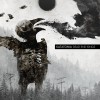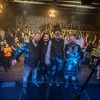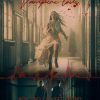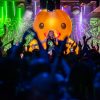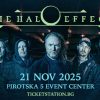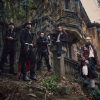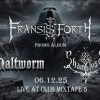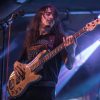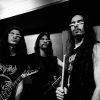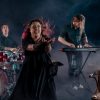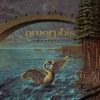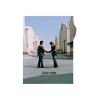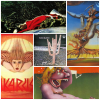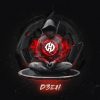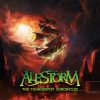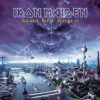Интервю с Jonas Renske, Katatonia
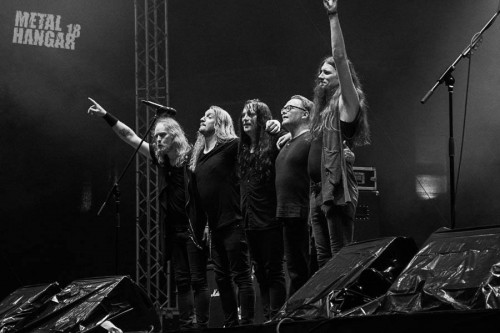 We share with you our interview with Jonas Renske, Katatonia, taken on July 29 this year ат ARTmania Festival, Sibiu, Romania. Jonas, frontman and one of the founders of Katatonia talked through band’s upcoming performance in Plovdiv with Plovdiv Symphony Orchestra, conducted by Levon Manukyan, Katatonia’s new album released just a month ago and the process of creating whole album of Katatonia.
We share with you our interview with Jonas Renske, Katatonia, taken on July 29 this year ат ARTmania Festival, Sibiu, Romania. Jonas, frontman and one of the founders of Katatonia talked through band’s upcoming performance in Plovdiv with Plovdiv Symphony Orchestra, conducted by Levon Manukyan, Katatonia’s new album released just a month ago and the process of creating whole album of Katatonia.
Katatonia is established in 1991 in Stockholm, Sweden by Jonas Renske and Anders Nyström. For concert performances other musicians are added and beside the two founders, the remaining lineup is constantly undergoing changes. The first two albums of Katatonia are released as classical death / doom albums, gradually, the style of the band evolve into progressive metal with clean vocals. After creating their masterpiece Great Cold Distance, group continues firmly developing their progressive sound with melancholic, depressive lyrics until the release of their most recent 10th studio album The Fall of Hearts in May this year.
On September 22, 2016, Katatonia will perform with Plovdiv Symphony Orchestra in the Ancient theater, Plovdiv as part of the festival Sound of Ages. The event is dedicated to the 25th anniversary of Katatonia and the 10th anniversary of the release of Great Cold Distance.
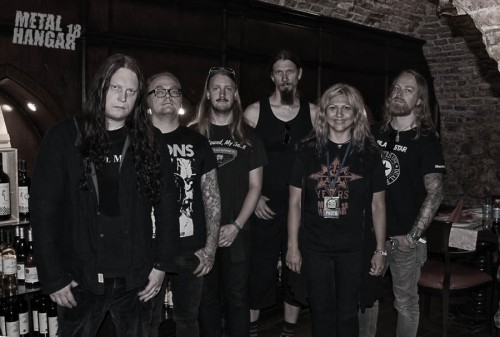 Hello Jonas, I am very glad to meet you here today. You have arrived yesterday for your appearance at ARTmania festival ? How do you find Sibiu? This is your first time in Sibiu? Do you have any impressions already?
Hello Jonas, I am very glad to meet you here today. You have arrived yesterday for your appearance at ARTmania festival ? How do you find Sibiu? This is your first time in Sibiu? Do you have any impressions already?
Jonas: We arrived last night. Yes, we were in Romania couple of times, but not in this city. It is new for us. We have not seen much, but it is very nice. It is almost medieval. It is very cozy.
This is your fourth appearance after you have released your new album The Fall of Hearts. What is the response of the audience to it? Do you have any impressions so far?
Jonas: Our new album is pretty recently released, so we are not trying to play so much of it. How many songs we do? Three, yes, three songs out of it, but so far it is going really good and this is just the beginning of the touring cycle. We are starting a little bit easy and we will see where it will take us, but so far, so good.
Your most recent setlist is based on albums released in the last 10 years. Do you think this period describes Katatonia best?
Jonas: Yeah, definitely. The last four albums are what probably we get as being contemporary Katatonia sound and also, of course, we always have a limited time to play which means that we have to choose wisely between the songs that we will play. Mostly, these are songs that we expect our audience to know and these are the most recent songs.
I am from Bulgaria and we are very impatient to have you playing with Plovdiv Philharmonic Orchestra at Sound of Ages in September. How did you come to the decision to celebrate your 25th anniversary with an orchestra in the Ancient Roman Theater in Plovdiv?
Jonas: I think it is a place where our manager has taken some other bands as Opeth and Paradise Lost and these other bands have recommended it to us. Our manager has asked us before, but we had no time to do it, but now, when the album Great Cold Distance turns 10 years and the band turns 25, this is a great place to go and do this concert, so it just came up at the right time. Probably we will be able to do this once in a lifetime , so we are looking forward to it.
In this relation you have a lot more orchestration in your most recent albums, more keyboards and even symphonic elements. Did you ever consider before doing such a concert with an orchestra in these 25 years?
Jonas: No, I do not think we ever had this idea. First of all it is very difficult to find an orchestra willing to work with us. Also it sounds to me like a very expensive project. So it is nothing that ever came to our minds before this whole thing happened, the Plovdiv experience.
Did you ever met Levon Manukyan, the director of the orchestra or spoke to him?
Jonas: No, no, we only exchanged a few e-mails so far. I think he is working on the orchestral part right now, but when we talked to Paradise Lost, they said you feel nervous in the beginning as you do not know what to expect, but once you get there it is all fine. According to them, we will do not be able to hear so much of the orchestra during the concert as we are with in-ear systems and we will do not hear it at all. I guess we will hear it at a later stage.
So, we will hear it before you?
Jonas: Yes, you will hear it first. May be I will go in the crowd for a few songs (laughing).
I was there for both concerts – of Paradise Lost and Opeth and it was impressive and the place is impressive
Jonas: Yes, that is one of reasons as well, the surroundings – it is perfect for this classical concert.
So, you have your setlist for Plovdiv?
Jonas: We are going to play Great Cold Distance in full and that is what we will play with the orchestra. And there will be another set, only us, with more songs from the other albums. But we are not playing the Great Cold Distance Songs. Or may we?
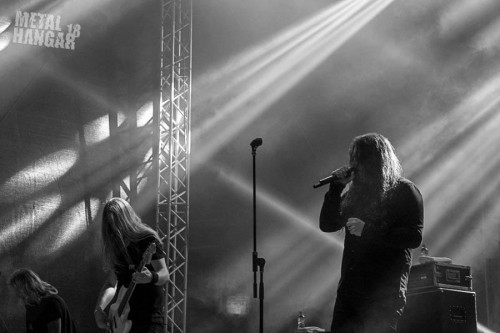 Depression and melancholy are like a hallmarks for Katatonia’s music. After 25 year of music and lyrics writing for Katatonia, do you think that you define your music or the music now defines you?
Depression and melancholy are like a hallmarks for Katatonia’s music. After 25 year of music and lyrics writing for Katatonia, do you think that you define your music or the music now defines you?
Jonas: Good question. Katatonia is such big part of our lives, more than any other bands I was in or can think of, because Katatonia is so closely connected to my lifestyle and I think it is the same with the others. So, it is almost like a philosophy for us. It not a band where you call the other guys “Let’s go jam in the basement and have fun” It more like a way of life, so I think music defines us, but we are still on top of the music as we have created it. But this is a very good question – I do not have a perfect answer to it.
In the recent years there is a tendency that many extreme bands take course into progressive sound as a way to express themselves. Do you think this is a natural process, something that is expected to happen? Do you think that the reason for all bands behind this decision is one and the same?
Jonas: I do not know, I think that certain bands that are going on for so long as we have always want to improve what they are doing, to challenge yourself and get your music to a next level, so for some of us, for Katatonia and other artists like Ihsahn who is playing here tomorrow, I guess for some of us, it is interesting to go in this direction because it is challenging and it is still very much kind of music that allows you to express the same feelings that you had perhaps 15 years ago, but in more refined way. Some bands will never go this way and that is good too.
In this relation, in the recent years which are the artists that impressed you most? You are a standard, band influencing many young bands. Did you notice any musician or band that impressed you in some way recently?
Jonas: Not in my head right now. I mean that it happens a lot that I am impressed, but I cannot think of anything specific right now. If I hear a band that sounds like Katatonia, that is a compliment, but of course I will want them to find their own style, not to copy Katatonia as this will do not get them anywhere. But is is a good starting point, each band needs guidance, so if this is a music you really like, you want to sound like that, but after that you have to find your own way. When we started 25 years ago, we wanted to sound like Paradise Lost.
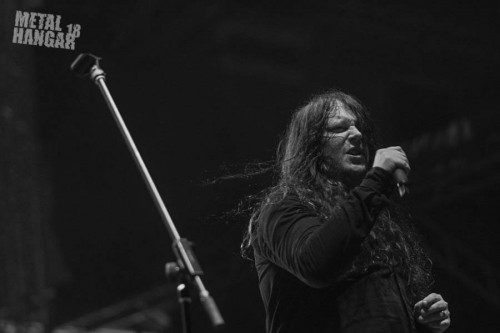 You have visual art for The Fall of the Hearts which is very impressive and also it is connected to the content of the album. This is something that is in force about any of your albums. Is someone of you visual artist as well or you sit down and decide in advance what do you want to create
You have visual art for The Fall of the Hearts which is very impressive and also it is connected to the content of the album. This is something that is in force about any of your albums. Is someone of you visual artist as well or you sit down and decide in advance what do you want to create
Jonas: Yes, we have usually a batch of ideas in the start working on a new album. At the same time when we are working on the music we think of some pictures. I think Anders, the guitar player is the most artistic guy in the band, so he is working very closely with Travis, who is doing the album art. So, we usually start with some very basic idea that we work on during the whole process and with Travis in the same time.
What is the importance of the work-art while creating the album and its subsequent presentation?
Jonas: For us it is very important. For the albums these days it is not that important, they are mostly downloaded, but for us, it comes from our background when we actually bought the albums. To us, the art-work is closely connected to what you get in the album. For us it has to be very connected. May be for bands that start today, they often do not need an album cover as they do not even release their music.
The lyrics for your music that you are writing, it is related to loss, death, separation and despair. Did your perception for those feelings and life events changed throughout the years and how? Do you feel a difference in the way you express yourself in the beginning and now?
Jonas: Yes, I think so, but it is very hard for me to say how, as it is an ongoing process, and I can’t really say, „ah, I remember when I started writing in a different way“. It is impossible. When I look at the stuff I wrote 15 years ago, I can see that I used a different approach. It was always that the lyrics are prompted to go hand in hand with the music, so the way of approaching it is different now.
Does this mean that first you write the music and afterwards you create lyrics for it?
Jonas: Yes, I tried the other way around, but it is not working, because if I write a lyric that I am very happy with and then try to put it into a song, sometimes it does not fit. It is a matter of rhythm and melodies and it may happen that some part I am very happy, I cannot use. So, I prefer always to wait. Of course, I collect ideas for lyrics, but I always wait for the last minute to actually finish it.
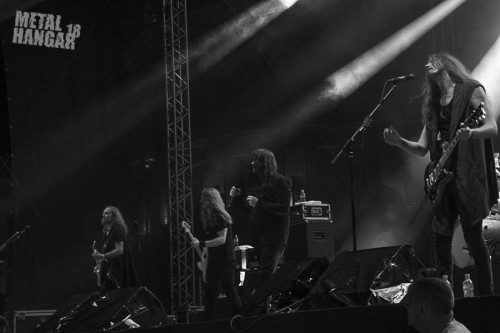 This is pretty common question, but do you think that the nature of the North is influencing your music and how do you connect to the nature – traveling, observing it or other way?
This is pretty common question, but do you think that the nature of the North is influencing your music and how do you connect to the nature – traveling, observing it or other way?
Jonas: I think that it is mostly observing. I am not out in the nature very much, unfortunately as it should be. I think, as a part of the world where we live, the nature is very important thing and it has been so from ages in the North. So, it is there somewhere in our background. Traveling through Sweden is very beautiful, I like doing that. It is somewhere deeply rooted in us.
In your most recent album The Fall of Hearts, you continue creating same atmosphere as in your previous albums; it is melancholic, dark, and desperate. However, I noticed few sparks of hope and light in some songs. What brings the light in?
Jonas: I think it is related to that we are constantly trying to make our music more interesting and if you use parts that sounds more lighthearted and then you go back to a dark thing, the contrast makes the dark part even darker. It is a play with light and shade, which is very interesting. I mean that I am not generally writing a happy music, but if you use it in small doses it can enhance the experience of the song.
What we can expect today? Some surprises?
Jonas: Not surprises, but hopefully, a very good gig. We all are looking to it, in this beautiful surrounding, hopefully we will go up there. Our shows are not dependent on anything else, but the music and I hope we will get there with the right songs.
Would you say few words for the Bulgarian fans that are impatiently waiting for you?
Jonas: Yes, I know :). It is a very long time since we played in Bulgaria. I think we played there once?
Yes, in Kavarna, 2011.
Jonas: So, we are eager to get back and the whole Plovdiv thing is such an amazing opportunity, so we are exceptionally looking forward to it.
